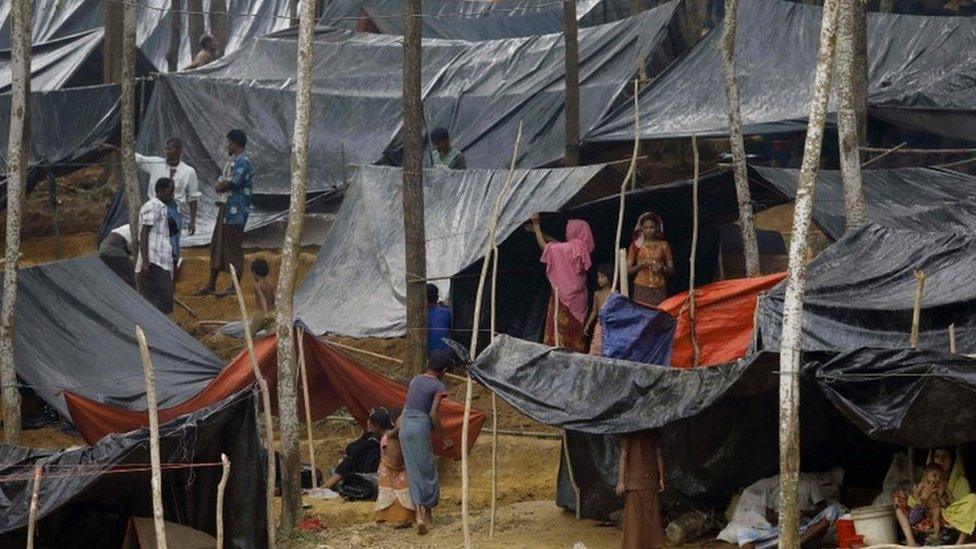MPs urge UK to help Myanmar's Rohingya Muslims
- Published

UK government ministers have been urged to help end the violence in Myanmar which some MPs claimed amounted to "ethnic cleansing" of Rohingya Muslims.
More than 123,000 Rohingya are now said to have fled the violence in Myanmar's Rakhine State since 25 August.
Labour's Liz McInnes called for a suspension of aid to the Myanmar army.
Foreign Office Minister Mark Field told the House of Commons the UK had "strongly urged the security forces in Rakhine to show restraint".
The UK has also called for humanitarian aid "to reach those in need as soon as possible", he said.
The conflict was triggered by an attack by Rohingya militants on police posts.
This sparked a military counter-offensive that has forced thousands of Rohingya civilians from their villages.
The UN said 123,600 had crossed the border in the past 11 days.
Their arrival has raised fears of a fresh humanitarian disaster as already crowded camps in Bangladesh - home to around 400,000 Rohingya refugees before the latest crisis - struggle to cope with the influx.
Many are sleeping in the open air and are in dire need of food and water after walking for days to reach safety, the UN's main co-ordinator in Bangladesh said in a report.
Labour's Yasmin Qureshi, who raised the issue in an urgent Commons question, said she was "a little bit disappointed" by Mr Field's response and the suggestion that "somehow the Rohingya Muslims had caused this to occur".
"In the last number of years, there's been a systematic rape and murder and burning and beheading of people of the Rohingya community," she said, adding that it was wrong to suggest the police station attacks could explain away "what the Burmese government is doing to these people".
Turning to the minister, she said: "Will you actually condemn this campaign of ethnic cleansing of the Rohingya Muslims?
"This is one of the worst examples of violence in decades, yet the international community is effectively remaining silent as we watch another Srebrenica and Rwanda unfold before our eyes. This situation requires urgent intervention."
'Collective punishment'
Mr Field said the UK had been "monitoring the situation for some time" and through "diplomatic sources had made sure our concerns are heartfelt".
He said British intervention had led to the UN Security Council discussing the issue this week, adding that the UK was one of the largest humanitarian donors to Burma and the Rakhine state, providing 拢30m in assistance on food and sanitation for more than 126,000 people over the last five years.
The UK is the largest single bilateral donor in Bangladesh supporting displaced Rohingya refugees and the vulnerable communities that host them, and has allocated 拢20.9m for humanitarian aid between 2017 and 2022, he said.
But shadow foreign minister Liz McInnes said because of "so-called collective punishment" for the police station attacks "more than 100,000 innocent Rohingya men, women and children have been forced to flee their homes in a campaign which UN officials say may amount to ethnic cleansing" with many ending up in squalid camps.
She said MPs were disappointed that Myanmar's de facto leader, Aung San Suu Kyi, had not spoken out "more forcefully against human rights abuses in Rakhine".
"This government must do everything it can to help bring to an end this senseless violence", Ms McInnes said, adding that it was "wholly inappropriate" the UK had sold weapons worth over 拢500,000 to the Myanmar government in the last three years.
"Would you accept that your colleagues and the Ministry of Defence demonstrated shockingly poor judgement in spending 拢250,000 from the aid budget, no less, on training members of Myanmar's army?"
Mr Field insisted the UK "does not provide any form of combat training to Burmese military" - but it does provide education courses focusing on language training, governance, accountability, ethics, human rights and international law.